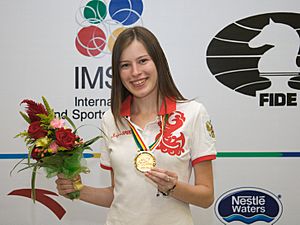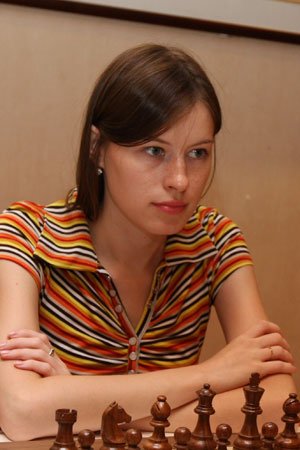Natalia Pogonina facts for kids
Quick facts for kids Natalia Pogonina |
|
|---|---|
 |
|
| Full name | Natalia Andreevna Pogonina (Наталья Андреевна Погонина) |
| Country | Russia |
| Born | March 9, 1985 Vladivostok, Russian SFSR, Soviet Union |
| Title | Woman Grandmaster (2004) |
| FIDE rating | 2475 (February 2026) |
| Peak rating | 2508 (July 2014) |
Natalia Andreevna Pogonina (Russian: Ната́лья Андре́евна Пого́нина) is a talented Russian chess player. She was born on March 9, 1985. Natalia holds the special chess title of Woman Grandmaster (WGM).
She achieved second place in the Women's World Chess Championship 2015. Natalia has also won the title of Russian Women's Champion two times. These wins were in 2012 and 2018. She was also part of the Russian team that won gold medals. This happened at the Women's Chess Olympiads in 2012 and 2014. Her team also won at the 2011 Women's European Team Chess Championship.
Contents
Natalia's Chess Journey
How Natalia Started Chess
Natalia Pogonina learned to play chess when she was five years old. Her grandfather taught her the basic rules of the game. She started studying chess more seriously in 1993. This was after she won a checkers tournament at her school.
Early Wins and Titles
Natalia first became well-known in 1998. She won the Russian under-14 girls championship that year. She also won two gold medals at the European Youth Chess Championship. She won in the U16 girls group in 2000. Then she won in the U18 girls group in 2003.
In 2004, Natalia Pogonina earned the title of Woman Grandmaster. This is a very high honor in chess.
Major Achievements and Medals
Natalia has many other important victories. She won the Bykova Memorial in 2005. She also won the Rudenko Memorial in 2007. She earned a bronze medal at the North Urals Cup tournament. In 2008, she shared first place at the women's World University Chess Championship.
In 2008, she won a gold medal in team blitz chess. She also got a bronze medal in team rapid chess. These were at the first 2008 World Mind Sports Games in Beijing. She played very well for the Russian team at the Women's 37th Chess Olympiad. She scored 6 out of 7 games.
In 2009, she finished first at the Moscow Open. She scored 8 points from 9 games. She also won a bronze medal at the Women's European Individual Chess Championship in 2009.
In 2011, Natalia Pogonina won gold medals. These were at the Women's European Chess Club Cup and the European Team Chess Championship. She also got a silver medal at the Women's World Team Chess Championship. In August 2012, she won the Women's Russian Chess Championship. She did not lose any games, with 4 wins and 5 draws.
Olympic Success
In 2012, Natalia played for the Russian women's team. They won the gold medal at the 40th Chess Olympiad in Istanbul. She played in eight of the eleven rounds. She won 6 games, drew 1, and lost 1. She also won a gold medal for her own performance.
In 2014, she played for the Russian women's team again. They won another gold medal at the 41st Chess Olympiad in Tromsø.
She reached the final of the 2015 Women's World Chess Championship. She played against Mariya Muzychuk but lost the final match.
Other Chess Activities
Natalia Pogonina has been a writer for Chess.com since 2009. She also has chess blogs on Sports.ru and RedHotPawn.com. She has hosted and commented on chess events. She did this for websites like ChessGames.com and Chessdom.com. In 2009, Natalia Pogonina became an ambassador for the Chess Elite software.
Personal Life
In 2008, Natalia Pogonina was studying law. She was working on her MA degree. This was at the Saratov State Academy of Law.
She has many hobbies outside of chess. These include flamenco dancing, music, and photography. She also enjoys travelling, sports, literature, and poetry. Her username on the Internet Chess Club is "Bagira."
On June 5, 2009, she married Peter Zhdanov. He is an IT specialist. Later in 2009, she gave birth to their son, Nikolai.
A Sample Game
| This section uses algebraic notation to describe chess moves. |
This game was a 25-move victory for Natalia Pogonina. She played with the Neo-Archangelsk variation of Ruy Lopez. Her opponent was former FIDE Women's World Champion Antoaneta Stefanova. After this win, Natalia Pogonina became a co-leader in the North Urals Cup-2007 tournament.
1.e4 e5 2.Nf3 Nc6 3.Bb5 a6 4.Ba4 Nf6 5.O-O Bc5 6.c3 b5 7.Bc2 d6 8.a4 Bg4 9.h3 Bxf3 10.Qxf3 b4 11.a5 O–O 12.d3 Rb8 13.Nd2 d5 14.exd5 bxc3 15.bxc3 Nd5 (See diagram) 16.d4 (White gives up a pawn to attack.) 16...exd4 17.Qd3 g6 (17...Nf6 does not work because of 18.Ne4 Nxe4 19.Qxe4, which leads to a winning fork for White.) 18.Qc4 (18.Qxa6 could be met with 18...Ne5. This move aims to counter 19.Ne4 with 19...Nxc3! White would then have to choose between a draw or a complex position.) 18...Rb5 19.Ne4 Ne5? (This was a mistake by Stefanova. After a better move like 19...Nc3, White would have faced problems.) 20.Qxd5 d3 21.Qxd8 Rxd8 22.Ba4 Rxa5 23.Bg5 Rb8 24.Bf6 Bf8 25.Bxe5 (If Black plays 25...Rxe5, then 26.Nf6+ and 27.Nd7 wins for White.) 1-0
See also
 In Spanish: Natalia Pogonina para niños
In Spanish: Natalia Pogonina para niños
 | Dorothy Vaughan |
 | Charles Henry Turner |
 | Hildrus Poindexter |
 | Henry Cecil McBay |


